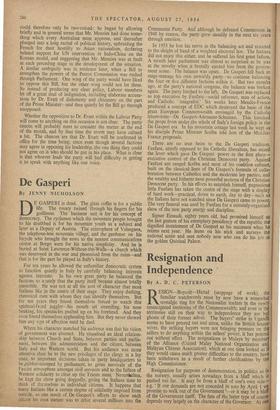De Gasperi
By JENNY NICHOLSON DE GASPERI is dead. The glass coffin is for a public life. The rosary -twined through his fingers for his godliness. The business suit is for his concept of democracy. The cyclamen which the mountain people brought to his deathbed is for his mountain youth as a subject and later as a Deputy of Austria. The atmosphere of Valsugana, the telephone-less mountain village, and the gardener on his bicycle who brought the news to the nearest communications centre at Borgo were for his native simplicity. And he is buried at Saint Lawrence-Without-the-Walls—a church which was destroyed in the war and phoenixed from the ruins—and that is for the part he played in Italy's history.
For ten years he allowed the unfamiliar democratic system to function quietly in Italy by carefully balancing interests against interests. In his own great party he balanced the factions so a cutely that the party itself became almost totally immobile. He was not at all the sort of character that most Italians like in the centre of their stage. They enjoy dashing, rhetorical men with whom they can identify themselves. But for ten years they found themselves forced to watch this spiritual-faced juggler—his mouth set unsmiling, his nose beaking, his spectacles pushed up on his forehead. And they even found themselves applauding him. But they never showed him any sign of affection until he died. Communist Party. And although he defeated Communism in 1948 by reason, the party grew steadily in the next six years through emotion.
In 1953 he lost his nerve in the balancing act and resorted to the sleight of hand of a weighted electoral law. The Italians did not enjoy this either, and he suffered his first great failure. A month later parliament was almost as surprised as he was at the novelty when it brutally ejected him from the govern- ment scene. The balance was upset. De Gasperi fell back to stage-manage his own unwieldy party—to continue balancing the four or five different factions within it. `But two months ago, at the party's national congress, the balance was broken again. The party lurched to the left. De Gasperi was replaced as top executive by Fanfani—social reformer, man of action, and Catholic integralist.' Six weeks later Mende,s-France produced a concept of EDC which destroyed the basis of the great European Commonwealth envisaged by the Catholic triumvirate—De Gasperi-Adenauer-Schuman. This knocked the props from under the whole of Italy's foreign policy in the De Gasperi era. In his mountain cottage last week he wept as his disciple Prime Minister Scelba told him of the Mcndes- France proposals.
There are no true heirs to the De Gasperi tradition. Fanfani, utterly opposed to his Catholic liberalism, has seized the lever which gave De Gasperi power in the first place- executive control of the Christian Democrat party. Against Fanfani are ranged Scelba and most of his coalition cabinet, built on the classical, lines of De Gasperi's formula of colla• boration between Catholics and the moderate lay parties, and the wealthy and hitherto most powerful sections of the Christian Democrat party. In his efforts to establish himself, pugnaciou9 little Fanfani has taken the centre of the stage with a display of hard work—practical, down to earth, day to day—such a9 the Italians have not watched since De Gasperi came to power t The very funeral was used by Fanfani for a minutely-organised show of the new party energy and discipline.
Signor Einaudi, eighty years old, had promised himself as the last gesture of his exemplary presidency of the republic th0 dignified instatement of De Gasped as his successor when h0 retires next year. Ho leans on his stick and surveys the national scene and sees nobody now who can do his job id the golden Quirinal Palace.


































 Previous page
Previous page